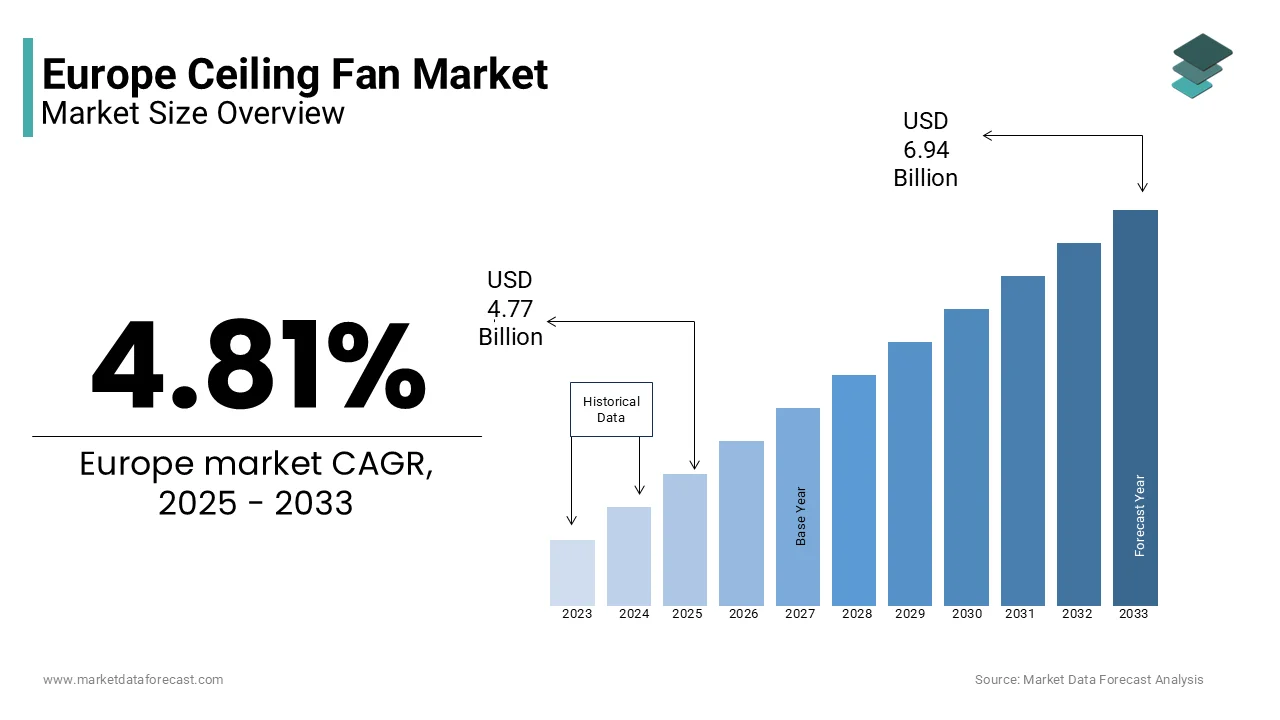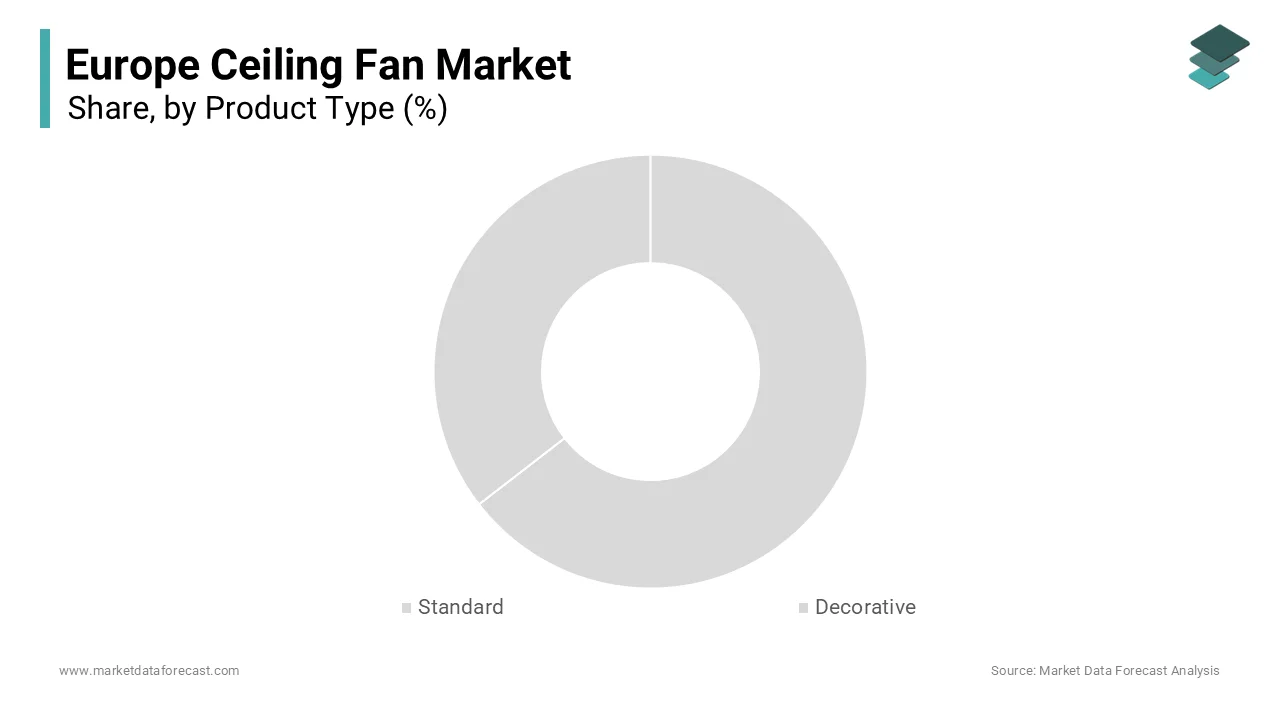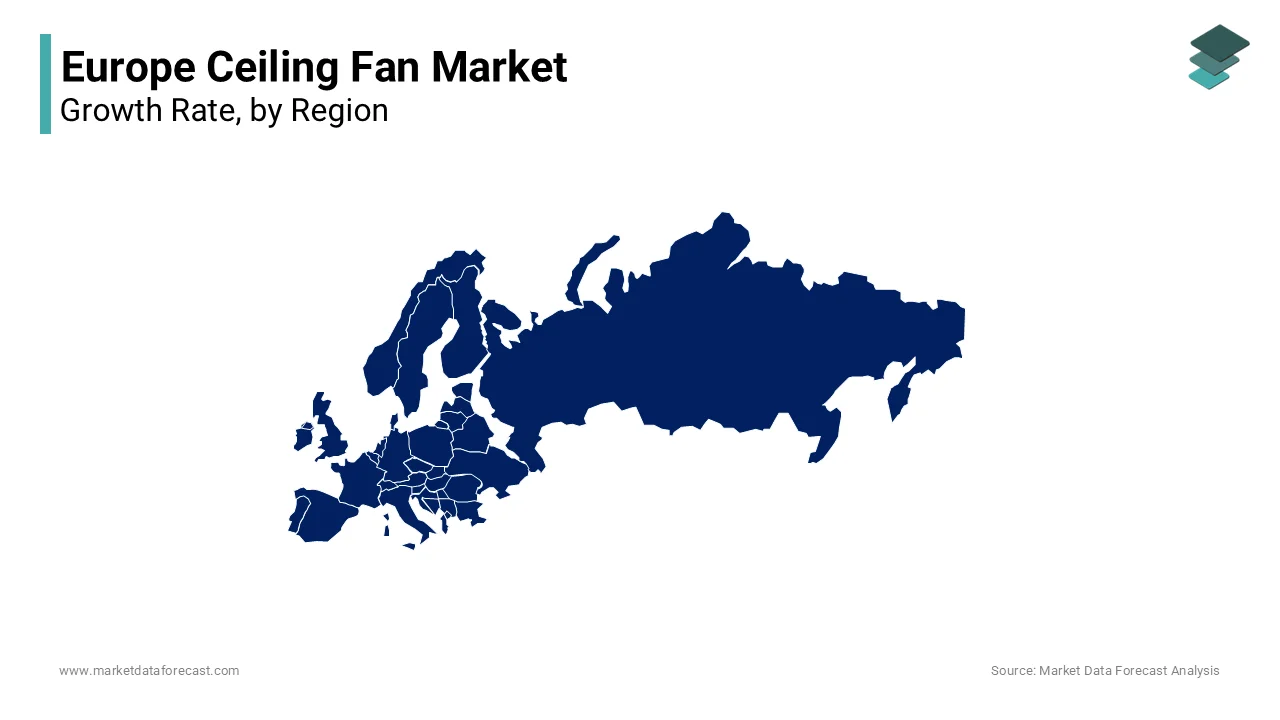Europe Ceiling Fan Market Size, Share, Trends & Growth Forecast Report By Product (Standard, Decorative), Type, Size, Application, Distribution Channel, and Country (UK, France, Spain, Germany, Italy, Russia, Sweden, Denmark, Switzerland, Netherlands, Turkey, Czech Republic & Rest of Europe), Industry Analysis From 2025 to 2033
Europe Ceiling Fan Market Size
The Europe ceiling fan market size was valued at USD 4.55 billion in 2024. The European market size is estimated to be worth USD 6.94 billion by 2033 from USD 4.77 billion in 2025, growing at a CAGR of 4.81% from 2025 to 2033.

The Europe ceiling fan market’s growth is driven by the increasing urbanization, rising energy costs, and a growing preference for energy-efficient cooling solutions. Countries like Germany, France, and Italy lead the market due to their robust construction industries and high homeownership rates.
For instance, as per Eurostat, over 70% of households in Western Europe now own ceiling fans is creating a robust demand for both standard and decorative models. Additionally, government incentives for energy-efficient appliances have accelerated adoption rates, ensuring sustained growth.
MARKET DRIVERS
Rising Energy Costs and Sustainability Trends
A key driver of the Europe ceiling fan market is the rising cost of energy and the growing emphasis on sustainability. According to the European Environmental Agency, energy-efficient ceiling fans consume 80% less electricity than traditional air conditioners is making them an attractive alternative for cost-conscious consumers. This trend is particularly pronounced in Southern Europe, where energy bills have surged by 25% since 2021, as per the Italian Ministry of Economic Development.
Additionally, advancements in smart ceiling fans with IoT integration have enhanced their appeal. For example, as per the German Federal Ministry for Economic Affairs, smart ceiling fan sales increased by 40% annually since 2020 by reflecting their growing importance in modern homes.
Urbanization and Residential Construction Growth
Urbanization and residential construction growth represent another major driver. According to Eurostat, urban populations in Europe have grown by 12% over the past decade, with over 60% of households owning private homes. This demographic shift has amplified demand for efficient cooling solutions, particularly in densely populated regions like Germany and France. Additionally, the rise of suburban living has increased the average home size, necessitating more advanced cooling systems. A study by the UK’s Office for National Statistics reveals that suburban homeowners spend approximately €200 annually on ceiling fans.
MARKET RESTRAINTS
Competition from Air Conditioners
Competition from air conditioners poses a significant restraint. According to the European Cooling Industry Association, air conditioners account for over 60% of the cooling appliance market due to their superior cooling capabilities. This competition is particularly intense in warmer regions like Spain and Greece, where affordability outweighs energy efficiency. Additionally, innovations in portable and ductless air conditioners threaten to erode market share for ceiling fans. According to a survey by the French Ministry of Housing, over 50% of urban consumers prefer air conditioners for their convenience is creating a formidable rival for traditional ceiling fans.
Fluctuating Raw Material Costs
Fluctuating raw material costs pose another restraint. According to the European Manufacturing Association, the price of copper and aluminum, key materials in ceiling fan production, has risen by 30% since 2021. This financial burden is particularly pronounced for small-scale manufacturers, which struggle to absorb these costs while maintaining competitive pricing. A study by the Italian Chamber of Commerce reveals that nearly 25% of manufacturers consider switching to alternative materials due to cost pressures, deterring them from opting for premium designs. These affordability issues create barriers to market expansion.
MARKET OPPORTUNITIES
Expansion into Smart Home Integration
The growing adoption of smart home technologies presents a significant opportunity for the Europe ceiling fan market. According to the European Smart Home Association, over 40% of households in Western Europe now use smart devices, creating a conducive environment for connected ceiling fans. For instance, as per the German Federal Ministry for Economic Affairs, smart ceiling fan sales have increased by 35% annually since 2020. Government subsidies for eco-friendly technologies have further boosted adoption. The UK’s Department for Business, Energy & Industrial Strategy reported a 20% increase in smart ceiling fan installations following the introduction of tax incentives.
Growing Demand for Decorative Models
Another major opportunity lies in the demand for decorative ceiling fans. According to the European Design Council, over 50% of consumers prioritize aesthetic appeal when purchasing home appliances, creating a robust demand for stylish and customizable models. For example, as per the French Ministry of Culture, decorative ceiling fans accounted for 30% of total sales in 2022, further driving adoption. Advancements in design and material innovation have reduced production costs, driving adoption. Partnerships between manufacturers and interior designers further amplify growth is positioning decorative fans as a transformative force in the market.
MARKET CHALLENGES
Stringent Environmental Regulations
Stringent environmental regulations represent a challenge. According to the European Environmental Agency, ceiling fan manufacturers must comply with strict energy efficiency standards by increasing compliance costs by 15%, as per the German Federal Ministry for the Environment. Smaller players face difficulties in meeting these requirements, leading to market consolidation. According to a survey by the European Home Appliances Association, nearly 20% of small-scale manufacturers have exited the market due to regulatory pressures, underscoring the need for supportive policies.
Limited Awareness Among Rural Consumers
Limited awareness among rural consumers poses another challenge. According to the European Consumer Organisation, over 60% of rural households lack knowledge about the benefits of energy-efficient ceiling fans is leading to underutilization. This issue is exacerbated in underdeveloped regions, where educational resources are scarce. Additionally, misconceptions about installation complexity deter many consumers from adopting advanced models. As per a study by the Polish Ministry of Housing, only 30% of rural homes have installed ceiling fans. This factor is likely to hinder the growth of the market in the next coming years.
REPORT COVERAGE
|
REPORT METRIC |
DETAILS |
|
Market Size Available |
2024 to 2033 |
|
Base Year |
2024 |
|
Forecast Period |
2025 to 2033 |
|
CAGR |
4.81% |
|
Segments Covered |
By Product, Type, Size, Application, Distribution Channel, and Region |
|
Various Analyses Covered |
Global, Regional, & Country Level Analysis; Segment-Level Analysis; DROC; PESTLE Analysis; Porter’s Five Forces Analysis; Competitive Landscape; Analyst Overview of Investment Opportunities |
|
Regions Covered |
UK, France, Spain, Germany, Italy, Russia, Sweden, Denmark, Switzerland, Netherlands, Turkey, Czech Republic, Rest of Europe |
|
Market Leaders Profiled |
Crompton Greaves Consumer Electricals Limited, Big Ass Fans, Ajanta Electricals, Fanimation, Craftmade, Minka Lighting LLC, Hunter Fan Company, Monte Carlo Fan Company, Mega Home Appliances, Kichler Lighting LLC, and others. |
SEGMENT ANALYSIS
By Product Insights
The standard ceiling fans segment was the largest and held dominate the market by holding a share of 60.4% in 2024. The growth of the segment is driven with their affordability and versatility that is making them suitable for a wide range of applications. For instance, according to the UK’s Office for National Statistics, standard fans account for over 70% of sales in urban areas. Key factors driving this segment include advancements in energy-efficient motor technologies. Additionally, government incentives for sustainable appliances have increased accessibility.

The decorative ceiling fans segment is likely to gain huge traction with a CAGR of 7.8% during the forecast period. This growth is fueled by their aesthetic appeal and ability to complement modern interior designs. According to the French Ministry of Culture, decorative fan sales have increased by 40% annually since 2020. Innovations in customizable designs and lightweight materials have driven adoption. Partnerships between manufacturers and interior designers further amplify growth is positioning decorative fans as a transformative force in the market.
By Type Insights
Indoor ceiling fans segment the prominent share of the Europe ceiling fans market in 2024. The growth of the segment is attributed to be driven with the widespread use of these fans in residential and commercial spaces, where they provide efficient cooling and air circulation. For instance, as per the German Federal Ministry for Economic Affairs, over 80% of indoor cooling solutions in Europe are fulfilled by ceiling fans in maintaining indoor comfort. Key factors driving this segment include advancements in energy-efficient designs and integration with smart home systems. Additionally, government incentives for eco-friendly appliances have increased adoption rates that is poised to ensure the sustained growth of the segment.
The outdoor ceiling fans segment is likely to register a significant CAGR of 9.2% during the forecast period. This growth is fueled by the rising popularity of outdoor living spaces, such as patios and gardens in warmer regions like Spain and Italy. According to the Italian Ministry of Tourism, outdoor fan sales have increased by 50% annually since 2021 with their growing importance. Innovations in weather-resistant materials and corrosion-proof designs have driven adoption. Partnerships between manufacturers and luxury outdoor furniture brands further amplify growth is positioning outdoor fans as a key driver of market expansion.
By Size Insights
The medium-sized ceiling fans segment was the largest and attributed in holding a share of 50.4% in 2024 owing to their versatility by making them suitable for both small apartments and medium-sized rooms. For instance, according to the French Ministry of Housing, medium-sized fans account for over 60% of sales in urban areas. Key factors driving this segment include affordability and ease of installation. Additionally, advancements in blade design and motor efficiency have enhanced performance will escalate the growth of the segment.
The large ceiling fans segment is likely to grow with a CAGR of 8.5% during the forecast period. The growth of the segment is fueled by their suitability for spacious areas like living rooms, lofts, and commercial spaces. According to the UK’s Office for National Statistics, large fan sales have increased by 45% annually since 2020. Innovations in high-speed motors and customizable designs have driven adoption. Partnerships between manufacturers and interior designers further amplify growth by positioning large fans as a transformative force in the market.
By Application Insights
The residential applications segment dominated the market and held a significant share of the in 2024. The growth of the market is due to the high homeownership rates and cultural emphasis on home comfort across Europe. For instance, as per Eurostat, over 70% of households in Western Europe own private homes by creating a robust demand for efficient cooling solutions.
Key factors driving this segment include urbanization and the rise of suburban living. Additionally, government subsidies for energy-efficient appliances have increased adoption rates that will likely to fuel the growth of the segment.
The commercial applications segment is anticipated to register a CAGR of 7.3% during the forecast period. This growth is fueled by the increasing demand for energy-efficient cooling solutions in offices, hotels, and retail spaces. According to the German Federal Ministry for Economic Affairs, commercial fan sales have increased by 40% annually since 2020. Advancements in industrial-grade fans and smart integration technologies have driven adoption. Partnerships between manufacturers and commercial developers further amplify growth is positioning commercial fans as a key driver of market expansion.
By Distribution Channel Insights
The offline distribution channels segment was accounted in holding a significant share of the Europe ceiling fans market in 2024 owing to the consumer preference for hands-on product demonstrations and immediate availability in rural areas. For instance, according to the Italian Ministry of Economic Development, offline sales accounted for 75% of total revenue in 2022. Key factors driving this segment include the presence of established retail networks and after-sales support. Additionally, partnerships with local dealers have increased accessibility will substantially fuel the growth of the market.
The online distribution channels segment is likely to experience a CAGR of 11.5% in the next coming years. The growth of the segment is fueled by the increasing penetration of e-commerce platforms and consumer preference for convenience. According to the German Federal Ministry for Economic Affairs, online fan sales have increased by 50% annually since 2020. Advancements in logistics and delivery systems have reduced operational costs that is escalating the growth of the market.
REGIONAL ANALYSIS
Germany was the top performer in the Europe ceiling fan market with an estimated share of 25.4% in 2024. The growth of the segment is due to the country’s robust manufacturing base and high homeownership rates. Germany’s emphasis on sustainability aligns with EU regulations is driving adoption of eco-friendly models. For instance, as per Eurostat, over 70% of households in Germany own private homes is creating a robust demand for efficient cooling solutions. Additionally, government incentives for recycling have increased the use of eco-friendly fans.

Turkey is expected to grow with a fastest CAGR of 9.8% in the next coming years owing to the rapid urbanization, increasing consumer spending, and rising exports of home appliances. Turkey’s ceiling fan market has grown by 30% since 2020 with the investments in modern manufacturing facilities. Additionally, government-led initiatives promoting sustainable construction practices have accelerated adoption is positioning Turkey as a key growth driver in the region.
Countries like France, Italy, and Spain are expected to witness steady growth due to their strong construction industries and export-oriented economies. Eastern European nations like Poland and Romania face challenges such as limited infrastructure but show potential due to ongoing reforms. The Czech Ministry of Trade predicts a 15% increase in ceiling fan investments by 2025. Meanwhile, Nordic countries benefit from stringent environmental regulations by ensuring equitable access to sustainable solutions.
KEY MARKET PLAYERS AND COMPETITIVE LANDSCAPE
Crompton Greaves Consumer Electricals Limited, Big Ass Fans, Ajanta Electricals, Fanimation, Craftmade, Minka Lighting LLC, Hunter Fan Company, Monte Carlo Fan Company, Mega Home Appliances, Kichler Lighting LLC are playing dominating role in Europe ceiling fan market.
The Europe ceiling fan market is highly competitive, characterized by the presence of global leaders and regional players vying for market share. Major companies like Hunter Fan, Minka-Aire, and Big Ass Fans dominate the landscape through continuous innovation and strategic collaborations.
Intense competition drives technological advancements, with firms focusing on developing cost-effective and scalable solutions. Regional players differentiate themselves by catering to niche segments, such as organic gardening or sports arenas. Regulatory compliance and adherence to sustainability standards further intensify competition by ensuring that only the most reliable products gain traction.
TOP PLAYERS IN THIS MARKET
Hunter Fan Company
Hunter Fan is a leading player in the Europe ceiling fan market, contributing significantly to innovations in energy-efficient and decorative models. The company specializes in producing high-quality products catering to residential and commercial users. Its focus on integrating smart technologies aligns with Europe’s sustainability goals, enabling it to maintain a competitive edge.
Minka-Aire
Minka-Aire is another key contributor, renowned for its expertise in premium and customizable ceiling fans. Minka-Aire’s strategic emphasis on expanding its product portfolio with weather-resistant models has driven growth. Its presence in Europe is strengthened by partnerships with local retailers, ensuring widespread adoption of its products.
Big Ass Fans
Big Ass Fans plays a pivotal role in advancing ceiling fan technologies, particularly in industrial and commercial applications. Its commitment to innovation and collaboration positions it as a major player in the market in high-growth regions like Germany and France.
TOP STRATEGIES USED BY THE KEY MARKET PLAYERS
Key players in the Europe ceiling fan market employ strategies such as sustainability initiatives, geographic expansion, and technological advancements to strengthen their positions. Sustainability initiatives are central, with companies investing in eco-friendly models to meet EU regulations. For instance, Hunter Fan has increased its use of recycled materials by 30% since 2021 by enhancing its sustainability profile. Geographic expansion is another focus, with firms targeting emerging markets like Turkey and Eastern Europe to tap into untapped potential.
Technological advancements also play a crucial role. Minka-Aire has introduced lightweight and weather-resistant models thereby reducing production costs and improving logistical efficiency. These strategies collectively drive market growth and ensure sustained competitiveness.
RECENT HAPPENINGS IN THE MARKET
- In April 2023, Hunter Fan launched a new line of AI-driven smart ceiling fans in Germany by reducing energy consumption by 25% while maintaining performance.
- In June 2023, Minka-Aire partnered with Italian interior designers to develop custom decorative fans by enhancing brand differentiation and market penetration.
- In September 2023, Big Ass Fans acquired a leading ceiling fan manufacturer in Turkey by strengthening its position in the fast-growing Middle Eastern market.
- In November 2023, Casablanca Fan Company introduced a cloud-based platform in Switzerland by streamlining the customization of fan designs based on consumer preferences.
- In February 2024, Fanimation collaborated with tech firms in France to develop solar-powered fans by positioning itself as a leader in eco-friendly solutions.
MARKET SEGMENTATION
This research report on the Europe ceiling fan market is segmented and sub-segmented into the following categories.
By Product
- Standard
- Decorative
By Type
- Indoor
- Outdoor
By Size
- Small
- Medium
- Large
By Application
- Residential
- Commercial
By Distribution Channel
- Online
- Offline
By Country
- UK
- France
- Spain
- Germany
- Italy
- Russia
- Sweden
- Denmark
- Switzerland
- Netherlands
- Turkey
- Czech Republic
- Rest of Europe
Frequently Asked Questions
1. What is the expected growth rate of the Europe Ceiling Fan Market from 2025 to 2033?
The Europe ceiling fan market is expected to grow at a CAGR of 4.81% from 2025 to 2033.
2. What are the key drivers of the Europe Ceiling Fan Market?
Key drivers include increasing demand for energy-efficient cooling solutions, advancements in fan technology, and rising consumer awareness about indoor air quality.
3. What are some of the major trends in the Europe Ceiling Fan Market?
Trends include the adoption of smart ceiling fans with IoT capabilities, increased focus on sustainable living, and expansion of distribution channels.
Access the study in MULTIPLE FORMATS
Purchase options starting from $ 2000
Didn’t find what you’re looking for?
TALK TO OUR ANALYST TEAM
Need something within your budget?
NO WORRIES! WE GOT YOU COVERED!
Call us on: +1 888 702 9696 (U.S Toll Free)
Write to us: sales@marketdataforecast.com